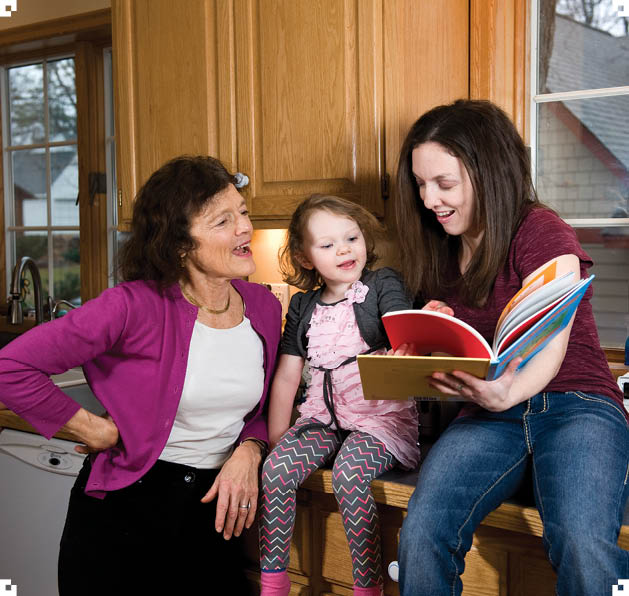In our modern society, moving back home after college or for a stint during adulthood usually brings to mind unemployment, lack of success or a failure to launch. But that stereotype doesn’t allow for the diversity of many parent-child relationships. We take a look at a few lake-area families who’ve kept their homes open to their adult children for a multitude of reasons and see how moving back in with Mom and Dad can be the best option.
Finding a Path
Beth Allen would never kick anyone out of her Deephaven home. Both of Allen’s adult children, Gunther Wolff and Emily Wolff, have spent portions of their adulthood living with their parents, and Allen welcomed them with open arms. She knows that being 18 years old isn’t the mark of an adult for everyone—for most, adulthood isn’t a number; it’s a state of mind achieved through life experience. Allen and her children know that experience can come in a variety of ways.
“I feel that there’s a problem with kids turning 18 and leaving home and parents saying ‘OK, make great decisions,’” Allen, an educator and former social worker, says. With research showing that brains don’t fully develop until age 30, Allen believes it’s imperative for parents to continue supporting their children.
When Gunther graduated from high school at age 18, he didn’t feel ready for college. He wanted to take the next step in life on his own terms rather than caving to the conventional wisdom of attending college. He enrolled with AmeriCorps and spent a year working with elementary students in St. Paul, and for an after-school program with predominantly Hmong and Somali enrollment. He was paid a small stipend to take part in the program, but not nearly enough to live on his own. The experience took him out of his familiar Minnetonka roots and allowed him to experience other cultures. And it wouldn’t have been possible without the support of his parents.
Following his stint with AmeriCorps, Gunther enrolled at the University of Wisconsin-Madison, but it didn’t stick. College wasn’t the right fit for him at the time and he left to take part in a program called Outward Bound, an international organization that teaches outdoor education. Gunther worked with Outward Bound in Costa Rica, and volunteered on his own in Nicaragua.
“I didn’t have any specific goals for life at that point,” says Gunther, “but I knew there were a lot of things I wanted to figure out about the world and myself. I thought that traveling could provide some of those experiences and a different kind of education.”
Following Outward Bound, Gunther bounced around. He spent about a year and half working at Trader Joe’s, living at home and saving money. He lived with a girlfriend in Philadelphia for a while. He became immersed in yoga and meditation. And he eventually settled back home with his parents to complete his four-year degree and work as a therapy aide in a rehab center. Through it all, he discovered his passion for physical therapy, and has spent the last year and a half pursuing a graduate degree at St. Catherine University and living on his own, debt-free—something many with an undergraduate degree can’t say.
“I don’t know if I could’ve had a lot of those experiences without living at home and having the financial and emotional support of my family,” Gunther says. “For where I was in those stages of my life, I don’t know if I could’ve made it work.”
Though Gunther has moved on, Allen and her husband Kurt Wolff still get to call their daughter, Emily, and 3-year-old granddaughter, Ava, roommates.
After going through a divorce, Emily moved in with her parents to help get back on her feet. As a single mother, she works long hours at a local Target store to save money, and would be left searching for childcare if she were on her own. “For Ava to be with her grandparents on a daily basis is the best possible situation,” Emily says.
No divorce is easy, and having the support of family to navigate a life transition has brought the entire family closer together. Ava not only gets to spend time with her mother, but also her uncle Gunther (who visits often) and both her grandparents. It’s a joy every family member raves about.

Beth Allen, left, with granddaughter Ava and daughter Emily says she loves getting more family time in.
A Family Affair
Like Allen, Phyllis Alsdurf has two children who have lived with her as adults. Alsdurf also understands the benefits of letting kids figure out their own path—even if that means spending more time with Mom and Dad.
Two of Alsdurf’s children, Hannah Alsdurf and Lydia Sponslier, moved home to stabilize a life transition. Older daughter Hannah had been working at a job in New York. With a master’s degree already in hand, and having done NGO work, she was experienced, but wanted to pursue more education. She returned home to save money as she applied for Ph.D. programs in public health.
Sponslier, Alsdurf’s younger daughter, moved in with her parents in 2009 as she finished college at Bethel University in St. Paul. Then in 2010, Sponslier’s fiancé also moved into the Alsdurf home after a roommate bailed on him. The couple lived in the Alsdurf home through their wedding in 2012—and through Sponslier’s pregnancy in 2013. What could have added to an already stressful situation was the exact opposite. “Those first few months can be really challenging,” Alsdurf says. “With a child and new marriage, there are so many things going on that having help for the first few months is a great thing.”
Sponslier agrees. “It definitely gave my husband and me a place to talk about issues and figure out our relationship,” she says. “It made us better able to deal with situations that arose once we moved out.” Sponslier and her husband made the transition into a place of their own last July with a healthy baby in tow.

Making It Work
There is no magic to making an unconventional living arrangement work. In fact, both Allen and Alsdurf say the transitions have been pretty easy, mostly because they like their kids. It might sound sappy or obvious, depending on your point of view, but if you love and respect your family members, it’s not that hard to get along with one another.
As in any happy home, keeping the peace has been all about communication. The parties respect each other’s boundaries and individuality. Parents are letting their children grow up on their own terms, and children are realizing that life happens on their terms. Letting it happen is the best advice any of them can give.
“Try to be OK with where you’re at,” Gunther says. “Don’t let other people, or your fears of what other people might be thinking, define how you feel about where you’re at in life. There really isn’t any right way to do life or do your 20s. There’s lots of ways and different ways work for different people.”






